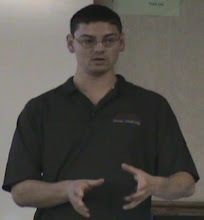
I've always been a big fan of space related things: I nearly wore out my VHS of Carl Sagan's Cosmos as kid and staying up to watch Voyager 2's flyby of Neptune was a highlight of the summer of 1989. (The image is a NASA image of Voyager.)
I've already brought up William Halal's work [1] in a few other posts. In it a Moon base is predicted around 2028 and Men on Mars shortly after, around 2030. Both of these estimates are with slightly more than 50% confidence. At first impression that sounds too soon to me, but then I think about how quickly we put men on the Moon- and with 1960's technology to boot. So after second thought it sounds reasonable. (I also recommend checking out Dr. Zubrin's Mars Society and work on Mars Direct, especially for those who don't think it is possible.)
So of course my mind started wondering, how will quantum computers play a role in space travel? The one area that jumps to the front of my mind is the simulation of quantum systems. A simulation could be used to investigate the potential of different propulsion schemes for example. Any simulation of a quantum system experiences an exponential slow down in the worse case on a classical (existing non-quantum) computer. So with a quantum computer you can do the sorts of simulations you wouldn't be able to do even if you had every classical computer in the world at your disposal. Who knows, maybe in Star Trek they're actually predicting problems with the warp core with a quantum computer? :)
I'm not saying that we need quantum computers for space travel. I see quantum computers as a specialized resource, as I mentioned in my More Thoughts on Quantum Computers Becoming a Reality post a few weeks ago. What I am saying is that maybe they will help us tackle some of these hard problems to make longer distance space travel a reality more quickly and/or perhaps more safe.
For more on Mars Direct, also check out one of Dr. Zubrin's latest speeches:
References
[1] W. E. Halal, Technology's Promise: Expert Knowledge on the Transformation of Business and Society, 1 ed. New York, NY: Palgrave Macmillan, 2008.

The National Space Society includes the former L5 Society, of which I was a member in the early 1980s. *grins*
ReplyDeleteGetting to Mars in the next few years sounds aggressive, yet Dr. Zubrin's book explains how it can be done.